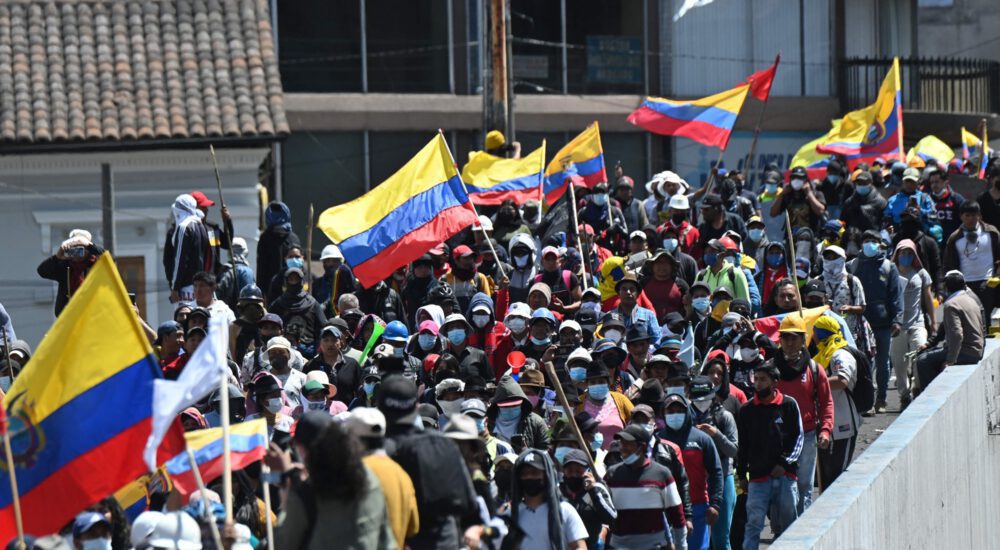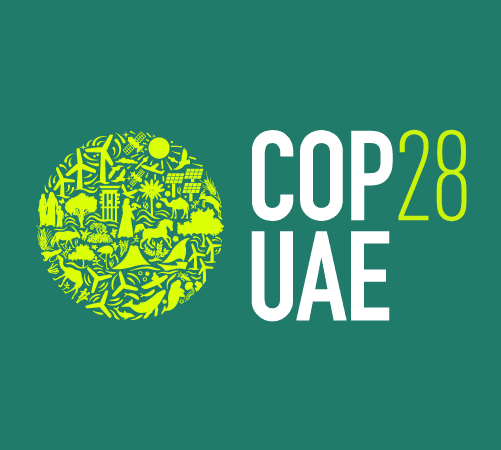Indigenous Movement in Ecuador ends protests after achieving major policy shifts on day 18 of strike
July 1, 2022

Quito, June 30th., 2022 — After 18 days of nationwide protests led by the Confederation of Indigenous Nationalities of Ecuador (CONAIE) to propose 10 policy reforms, the national strike ends after reaching 9 milestones in a “Peace Agreement” that effectively ends plans for massive oil and mining expansion in Indigenous territories. While this is a true victory for the indigenous movement — if the government upholds its commitments – it is important to also remember those that died and were wounded.
This strike was not the first attempt to set up a dialogue with President Lasso. On October 18, 2021, hundreds of elders, youth, and indigenous leaders arrived in Quito after having walked hundreds of kilometers from their communities in the Amazon rainforest to demand the Ecuadorian government to respect their decision to keep their territories free of oil and mining. Today´s outcome should have been the result of a dialogue 7 months ago.
Here is a summary of the negotiated agreement between the government and the indigenous movement:
- To eliminate Decree #95: More than half (52%) of the Ecuadorian Amazonia is an oil block. Oil exploitation to pay the debt with China and other debt holders occurs mainly in Indigenous and uncontacted peoples’ territories. Decree 95 has been the vehicle to put into action President Lasso´s goal to double oil production from the current 473,555 barrels per day to one million barrels per day within 5 years at all costs. This decree implicated the expansion of the oil frontier in indigenous territories and intact forests affecting 7 indigenous nationalities and the other half of the Ecuadorian Amazonia. The new blocks cover 90 to 100% of indigenous territories. Decree 95 was not consulted with the indigenous peoples potentially affected, who claim that they did not give their consent either.
50 years of oil extraction show that extractivism is not the path. Ecuador’s social protests and political turmoil are a global responsibility. The oil supply chain involves international banking, mainly European banks in oil trade and US banks financing the projects. US oil companies and refineries are complicit as 89% of the Amazon’s oil come from Ecuador and two-thirds is exported to the US, with the majority destined for California. In today’s historic negotiation, Marlon Vargas, President of the Confederation of Indigenous Nationalities of the Ecuadorian Amazon (CONFENIAE) declared:
“The Amazon bleeds every day. When there is an oil spill nobody says anything. Our rivers, waterfalls, lagoons, and territories cannot be cultivated because they are contaminated. We live by hunting and fishing and the fish are contaminated with oil. There are no schools in our territories…we cannot be branded as vandals or drug traffickers, we are the ones who take care of our territories so that there is peace and tranquility.”
- Reform of Decree #151- approved on August 5th, 2021 this Decree is the umbrella for the “National Mining Plan.” Indigenous federations seek to exclude their territories, strategic water sources, and protected areas from any mining initiative as part of the current negotiation.
In November 2021, indigenous leaders filed a lawsuit against the Executive Decree 151. According to indigenous leaders, the aim is to relax environmental controls to accelerate the entry of foreign mining multinationals into the Amazon, despite the decision of the peoples to keep their territories free of this activity.
- To enforce the application of the Free Prior Informed Consent (FPIC) for all decisions that entail Indigenous Territories.
- As a result of the negotiation, the government approved Decree 454 to declare an emergency in the health sector. This means that the government will transfer USD 200 million immediately to the public health system.
- The negotiation deal breaker was the reduction of USD 0.15 cents per gallon of gasoline and diesel respectively, although the original proposal from CONAIE was 0.40 cents. Lasso’s policies have increased the price of diesel by 65% and gasoline 37% in his first year in office. The elimination of fuel subsidies has resulted in inflation and the price of essential products is skyrocketing.
- The government will subsidize 50% of the value of urea, a fertilizer used by most farmers.
- The government will facilitate the granting of agricultural credit for up to USD 5,000 at 1% interest and a 30-year term.
- Indigenous leaders have emphasized the need for them not to be criminalized or subjected to violence.
- The rest of the reforms proposed by CONAIE that have not been addressed in the declaration signed by the government and CONAIE today will be reviewed within 90 days in technical working tables. If agreements are not reached within this period (90 days), the indigenous movement announces to resume the strike.
Ecuador needs an immediate transition to an economy beyond extractivism and that effectively protects its vital natural and cultural heritage and respects indigenous rights and territories. Stand.earth stands in solidarity with indigenous leaders and civil society and all of those who have been on the front lines to change the course of history.



